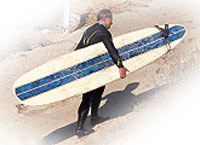Let us not become weary in doing good, for at the proper time we will reap a harvest if we do not give up. Therefore, as we have opportunity, let us do good to all people ... (Galatians 6:9-10 NIV).
Dorian Paskowitz saw a need, and the fact that he's Israeli and those in need are Palestinian doesn't seem to have mattered to him.
Dorian is a retired doctor from Hawaii, 86 years old, who read about the need and decided to do something about it. He and his son left sunny Hawaii for the war-torn Gaza Strip for their mission of mercy. Dorian calls it a "mitzvah," a Hebrew word that means "good deed." While you might expect Dorian to bring medical supplies, you'd be wrong. While you wouldn't be surprised if he was bringing food or clothing, you'd be mistaken.
Dorian Paskowitz went to the Gaza Strip bearing gifts for the Palestinians that are very near and dear to his heart. Though he practiced medicine for a half a century or so, he has been a surfer for twenty-five years longer than he was a doctor. And when he read about two Palestinian surfers who had to take turns in the gnarly surf off the Gaza Strip, he could sit still no longer. "I said to my son, 'Come, we'll go to Israel and get them some boards,'" Dorian explains matter-of-factly. That's how it came about that Dorian Paskowitz, tanned and shirtless, happened to be at the Gaza-Israeli border handing off twelve surfboards to a grateful group of amazed Palestinian surfers.
"When a surfer sees another surfer with a board, he can't help but say something that brings them together," Dorian says, brushing off the obvious observations about Israeli-Palestinian tensions.
"God will surf with the devil if the waves are good."
Whether you agree or not, you have to admire the enthusiasm that leads Dorian to such a conclusion. Arthur Rashkovan, an Israeli surfer who calls Paskowitz a guru who brought surfing to Israel fifty years ago, has maybe a more realistic idea: "We want Palestinians to enjoy the surfing experience. We believe it brings people together. The idea is for people to forget about the violence and follow the journey to peace on the waves."
To tell you the truth, I think Dorian Paskowitz is on to something. Diplomacy, politics, treaties, and laws can't create peace. Wars can bring about conquest, but battering people into submission is not the same as bringing about peace. In the end, what creates peace is people doing good to people, however they have opportunity, until a society loses its capacity for hate, its impulse for violence, and its motivation for war. Twelve surfboards won't end centuries of hostilities, of course. But, find enough people willing to risk "mitzvahs" of their own, and suddenly anything's possible.
It was another Israeli, Paul, who said, "[A]s we have opportunity, let us do good to all people." I like the realism of that. "[A]s we have opportunity ...." Good deeds aren't necessarily big deals that take you halfway around the world — maybe just across town or across the street or across the hall. The kind of good Paul is talking about is the everyday kind that might not garner headlines, but that can make all the difference in the world. It's a visit to a sick friend who really needs her spirits lifted. It's a kind word to someone who has the weight of the world on his shoulders. It's babysitting the kids of a couple who are struggling with their marriage and need time for each other. It's raking the yard of that widowed neighbor who can't afford to have it done and has no one else to do it for her.
I guess that's why Paul warns us that our tendency will be to become weary of doing good. It's not that doing good is in itself all that exhausting, though it can be. I wonder if he means, though, that sometimes it doesn't seem to make a difference. After all, the beggar is still a beggar after he eats the sandwich I give him, and pretty soon he'll be hungry again. That single mom doesn't have to buy her kids' school supplies, but what about the braces and the winter coats and the house payment? That sick friend will still be sick after my visit, and that couple might still split up. And even after Dorian Paskowitz dropped off those boards, Israelis and Palestinians live in tension. What good we're able to do might not have any long-term benefit. It might not solve any "big" problems. And that can be tiresome.
Paul, however, promises that good deeds are never in vain. "At the proper time we will reap a harvest," he promises — if we don't give up. That's what distinguishes the Big Kahunas of doing good from the posers — follow-through. Paul says you "do good" just because you have an opportunity to do good, not because you see how it contributes to an overall solution, or as part of a bigger plan. You "do good" as you have opportunity, and you leave it to God to sort out the things that are too big for you. And more often than not, you'll eventually see how he used your good deed, your "mitzvah," to do something bigger than you ever imagined. In his time — the proper time — you'll have your harvest.
Until then, keep your eyes and ears and heart and mind open to the good God wants you to do ... the good you have opportunity to do. It might not be what you imagined and it might take you to people you'd have never thought you would serve, but if God's calling you to do it then there's a reason. Get your balance, get in the pipeline, and ride the wave wherever it takes you.
Cowabunga!









Reader Comments
Archived Facebook Comments